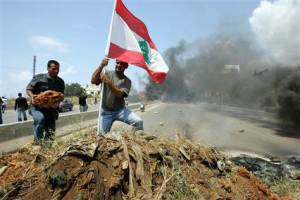
The pro-Syrian March 8 Alliance, which is actually led by Hezbollah’s leader Sheikh Hassan Nasrallah, is made up of the Shi’a Amal Movement headed by Nabih Berri and Christians from the Free Patriotic Movement of Michel Aoun. The anti-Syrian March 14 Movement bloc is headed by the Sunni (Al-Mustaqbal) Future Movement’s leader Saad Hariri (Rafic Hariri’s son) supported by Saudi Arabia. This bloc, apart from Saad Hariri’s party, includes a number of Christian organisations.
The crisis around and inside Syria contributed to the fact that confrontation between the two Lebanese political camps has increased dramatically. The pressure on the Syrian president from the West as well as Saudi Arabia’s support gave confidence to the March 14 Movement, which urged for immediate resignation of Assad and practically joined forces with the Syrian opposition. Recalling the crimes of the Syrian regime in Lebanon, the bloc is thus trying to consolidate its own social base. However, serious strengthening of the positions of the March 14 Movement has not taken place.
At the same time, the aspiration of the moderate elements for stability in the country, as well as for political self-preservation contributed to their retreat from the conflicting coalitions towards the centre, which is represented by Lebanon’s President Michel Suleiman, who has repeatedly claimed that Lebanon will continue to maintain “active neutrality” regarding the Syrian crisis and prevent the use of the territory of Lebanon as a transit route to transfer mercenaries and weapons to Syria.
The complexity of the situation in Lebanon is due to the fact that, along with the parliamentary parties, the country has numerous factions supporting either the Syrian president or the opposition. This particularly manifests itself in the north of the country, in the city of Tripoli, where there are constant clashes between the radical Sunni groupings, who support Syrian rebels, and the Alawites, as well as Sunnis, who support Syria’s president.
Most Lebanese experts believe that the organisers of these clashes are the external forces seeking to organise “controlled chaos” in Lebanon. In particular, director of the National Centre of North Lebanon Al-Haj Kamal al-Khair expressed a similar opinion: “The problem is that the north of Lebanon has become some sort of trans-shipment point. It is here that the Syrian-Lebanese border is crossed by mercenaries from different countries, who then join the ranks of rebels and start fighting against the government troops. What’s more, the Syrian insurgents are supplied with smuggled arms. The army is trying to prevent these activities, and many, obviously, do not like this. It has to be understood that it would be impossible to organise these actions without certain external support – in the first place, the financial one.Hence, this testifies to the fact that the events in Lebanon are part of the American strategy regarding Syria.”
The numerous armed clashes between the supporters of the Syria president and their opponents get stopped thanks to the interference of the army, but the neutrality of the Lebanese army – which, at least on the face of it, is above religious contradictions – is challenged. The Salafis accuse the Lebanese military that they support the Alawites in Tripoli. The accusations of connivance with the Shi’ites escalated after the killing of Sunni Sheikh Abdel Wahed in October 2013. It is a very dangerous precedent which can lead to the army’s involvement in religious confrontation.
A serious factor making the situation in Lebanon even more complicated has been the presence in its territory of the Syrian refugees – more than one million people who are the breeding ground for the extremists recruiting mercenaries to carry out terrorist acts in the Syrian territory.
Many experts believe that, in spite of the resumed sectarian clashes in Lebanon, it is very unlikely that a civil war might begin in this country in the near future as the population still remembers very well the recent internal bloodshed which ended in 1990. Besides, unlike the situation prior to the war in 1975, many communities have no armies of their own; the internal political line-up of the forces in Lebanon has changed as well.
However, there is another point of view, according to which the war will spread from Syria to Lebanon much sooner than anticipated and Lebanon will pay the price for Hezbollah’s involvement in hostilities on the Syrian government forces’ side. Saudi Arabia and Qatar, which have until recently supported stability in Lebanon, are now igniting the Sunni-Shi’a conflict and they are not considering Lebanon as a single whole.
Leader of the Free Patriotic Movement Michel Aoun has named the countries jeopardising the existence of Lebanon: “The Kingdom of Saudi Arabia, Turkey and Qatar have been sowing in our country sectarian contradictions hoping for the help of the United States and Europe. Today, this plague has started to spread to our cities – Akkar and Tripoli.”
Nevertheless, the conflict in Lebanon should not be placed at the same level as the events of the Arab Spring. Lebanon is the only country in the region where there is a very old confessional system of governance which allows representatives of each major faith to be involved in power. The President of Lebanon can be only a Christian (exclusively, a Maronite Christian), the Prime Minister – only a Sunni Muslim, the Speaker of the Parliament – a Shi’a Muslim; the post of the Defence Minister traditionally goes to a Druze, and the Education Minister – an Orthodox Christian. Therefore, there are no conditions in the country for establishing authoritarian power; hence, mass rioting against the ruling regime – like it was in Libya and Egypt – is impossible.
Vladimir Shevchenko, research fellow at the Centre for Arab Studies at the Institute of Oriental Studies RAS, exclusively for the New Eastern Outlook online magazine
